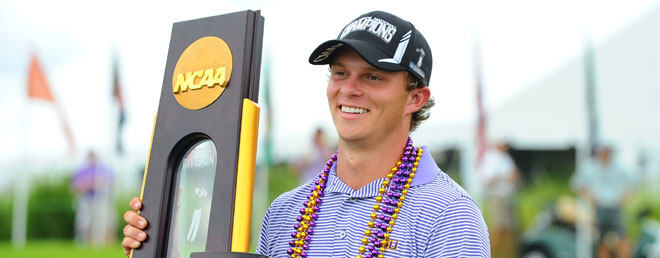Pierce Recipient of David Toms Overcoming Adversity Award presented by the AJGA

LAS VEGAS – Brandon Pierce, a senior at LSU, has been named recipient of the David Toms Overcoming Adversity Award presented by the AJGA. Pierce twice overcame injury to be one of the nation’s elite college golfers.
Pierce struggled to break the Tigers lineup his freshman year in the fall of 2013, only playing twice while balancing his studies in the engineering department. After missing out in qualifying for the first two events in the spring he was selected to play as an individual in the team’s third event. During the tournament’s final round Pierce struck a tree root. While he felt pain from the impact, he finished the round. Pierce continued to practice for the next few weeks, even though on one occassion he collapsed due to the injury.
After medication and cortisone shots could not help with the pain, Pierce and LSU consulted a doctor. The doctor informed Pierce that he had fractured his lower back. Recovery time would be six-to-nine months. Fortunately, surgery was not needed, allowing the bone to heal stronger than it was before.
Pierce continued to support the team and help his teammates reach their potential during his recovery. Personally, he was consulting a sports psychologist. He also worked on his physical strength to come back at 100-percent.
His work paid off when Pierce qualified for the first tournament of the 2015 spring season. He finished in the top 10 in that event and went on to have one of the best seasons in LSU history. In eight tournaments played, Pierce posted a 71.16 scoring average, eclipsing David Toms 26-year-old school record. Additionally, he helped lead the Tigers to the 2015 NCAA Championship with an unbeaten record in match play. Pierce earned PING Honorable Mention All-America honors and was named to the SEC Academic Honor Roll.
Soon after experiencing the high of the Tigers winning the NCAA Championship, Pierce experienced the most difficult moment of his life after fracturing multiple vertebrae in his neck and ligamentous tears in a swimming accident. He required surgery the next day as his neck was unstable. Doctors told Pierce he was fortunate that he was not paralyzed. Before the surgery they outlined the risks, including that Pierce may not walk or play golf again. Following the procedure the surgeon informed Pierce that it was the best neck surgery he had performed.
Even with the surgery’s success, Pierce faced difficult recovery and rehabilitation. He would spend months in a restrictive neck brace which limited him to laying in bed or sitting in a chair. Unlike the recovery from his previous back injury Pierce was uncertain and timid about practicing golf.
Pierce also suffered an emotional toll. Despite his positive recovery, Pierce has serious doubts about himself, his game and how one mistake could have so negatively impacted himself and those around him. He had difficutly sleeping and experienced depression.
With the support of his family and coaches, Pierce received help in his battle with depression. He attended weekly counseling sessions with a sports psychologists. Through their combined support he began to believe in himself and found playing golf fun again. Pierce was able to compete in a few events in the fall of 2015 and the entire spring 2016 schedule. He helped LSU reach match play at the NCAA Championships for the third-straight season and again was named to the SEC Academic Honor Roll. This past summer Pierce advanced to the Round of 32 at the U.S. Amateur. He won his first collegiate event, The David Toms Intercollegiate, this fall.
“I’m very honored to have even been considered for the David Toms Award,” said Pierce. “Looking back at the past recipients I wasn’t even sure I should have been in the same category. I was surprised and shocked that I had won this prestigious award and couldn’t be any more grateful. I want to thank everyone who supported me and helped me through my recoveries, they are the ones who deserve praise.”
About the American Junior Golf Association:
The American Junior Golf Association is a 501(c)(3) nonprofit organization dedicated to the overall growth and development of young men and women who aspire to earn college golf scholarships through competitive junior golf. The AJGA provides valuable exposure for college golf scholarships, and has an annual junior membership (boys and girls, ages 12-18) of more than 6,300 members from 48 states and more than 50 foreign countries. Through initiatives like the Achieving Competitive Excellence (ACE) Grant, a financial assistance program, and Leadership Links, a service-oriented platform that teaches juniors charitable-giving skills, the AJGA fosters the growth of golf’s next generation.
AJGA alumni have risen to the top of amateur, collegiate and professional golf. Former AJGA juniors have compiled more than 600 victories on the PGA and LPGA Tours. AJGA alumni include Jordan Spieth, Brandt Snedeker, Bubba Watson, Webb Simpson, Hunter Mahan, Phil Mickelson, Tiger Woods, Stacy Lewis, Vicky Hurst, Inbee Park, Paula Creamer, Cristie Kerr, Brittany Lincicome and Morgan Pressel.